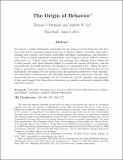The Origin of Behavior
Author(s)
Brennan, Thomas J.; Lo, Andrew W.
DownloadLo_Origins of behavior.pdf (553.9Kb)
OPEN_ACCESS_POLICY
Open Access Policy
Creative Commons Attribution-Noncommercial-Share Alike
Terms of use
Metadata
Show full item recordAbstract
We propose a single evolutionary explanation for the origin of several behaviors that have been observed in organisms ranging from ants to human subjects, including risk-sensitive foraging, risk aversion, loss aversion, probability matching, randomization, and diversification. Given an initial population of individuals, each assigned a purely arbitrary behavior with respect to a binary choice problem, and assuming that offspring behave identically to their parents, only those behaviors linked to reproductive success will survive, and less reproductively successful behaviors will disappear at exponential rates. When the uncertainty in reproductive success is systematic, natural selection yields behaviors that may be individually sub-optimal but are optimal from the population perspective; when reproductive uncertainty is idiosyncratic, the individual and population perspectives coincide. This framework generates a surprisingly rich set of behaviors, and the simplicity and generality of our model suggest that these derived behaviors are primitive and nearly universal within and across species.
Date issued
2011-03Department
Sloan School of ManagementJournal
Quarterly Journal of Finance
Publisher
World Scientific
Citation
Brennan, Thomas J., and Andrew W. Lo. “The Origin of Behavior.” Quarterly Journal of Finance 01.01 (2011): 55–108.
Version: Author's final manuscript
ISSN
2010-1392